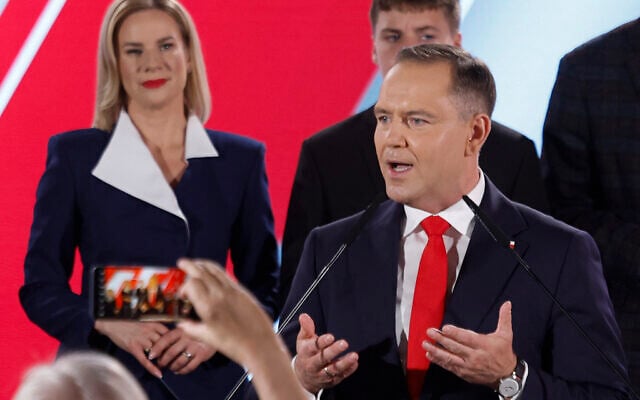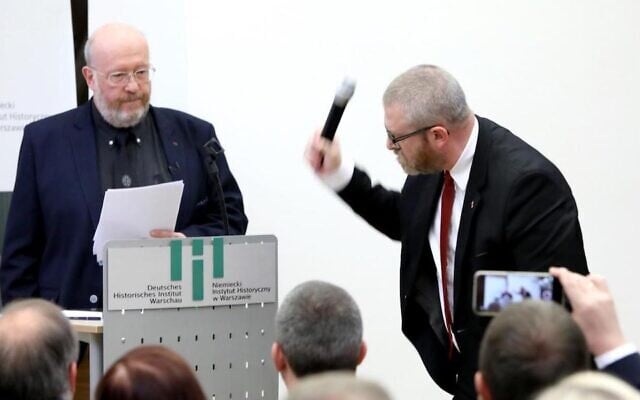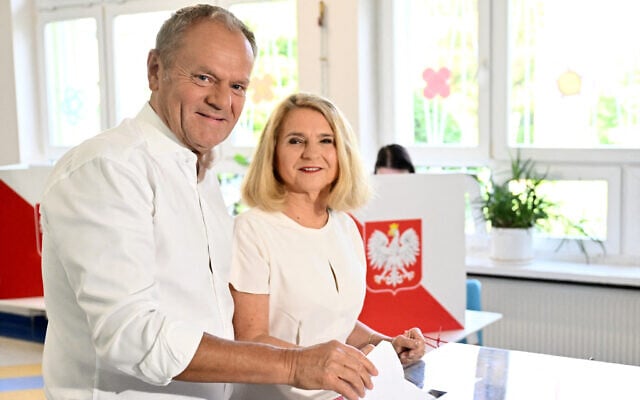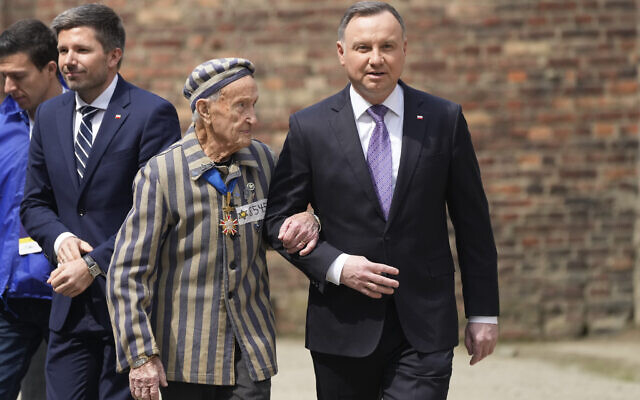



Both candidates in Poland’s runoff presidential election on Sunday claimed victory after an exit poll showed Warsaw’s pro-EU mayor Rafal Trzaskowski just 0.6% ahead of his rival, right-wing historian Karol Nawrocki, who has made Holocaust revisionism part of his campaign.
“We won… by a whisker,” Trzaskowski, 53, who is backed by the ruling Civic Coalition party, told supporters after the Ipsos poll showed him narrowly ahead with 50.3 percent.
Nawrocki, 42, who is supported by Poland’s outgoing conservative President Andrzej Duda and US President Donald Trump, was at 49.7 percent. “Tonight we will win,” Nawrocki told his election night rally. “We will win and we will save Poland.”
The Ipsos exit poll had a margin of error of plus or minus 2 percentage points, and the final vote is likely to change somewhat, making the result still too close to call.
The state electoral commission was expected to release the final vote count on Monday, though the result could be known sooner.
The runoff follows a tightly contested first round on May 18, in which Trzaskowski won just over 31% and Nawrocki nearly 30%, eliminating 11 other candidates.
Far-right candidates Sławomir Mentzen and Grzegorz Braun came in third and fourth, giving Nawrocki a larger pool of right-wing voters to draw on in the runoff.
Nawrocki, who has the support of Trump, hasn’t wasted time courting those voters. He signed a list of Mentzen’s demands, such as refusing to ratify Ukraine’s entry to NATO, sending Polish soldiers to Ukraine, or expanding EU powers.
He has also sought favor from Braun, who made antisemitism a feature of his campaign, asking his rivals in a televised debate last month what they planned to do about the “Judaization” of Poland. In 2023, Braun used a fire extinguisher to blow out Hanukkah candles in parliament and violently stormed a lecture by Grabowski. This year he disrupted a moment of silence for the Holocaust to denounce “Jewish genocide in Gaza.” His campaign posters showed him posing with a fire extinguisher.
Nawrocki told Braun that he would fight “all the disgusting attacks” on Poland by Holocaust scholars, and had previously promised to end the tradition of lighting Hanukkah candles in the presidential palace.
A victory for Nawrocki would embolden the populist Law and Justice party, which ruled Poland between 2015 and 2023, and could lead to fresh parliamentary elections.
The candidacy of Nawrocki, an amateur boxer, has been clouded by allegations of past connections to criminal figures and participation in a violent street battle. He denies the criminal links but acknowledges having taken part in “noble” fights. The revelations have not appeared to dent his support among right-wing voters, many of whom see the allegations as politically motivated.
Many Nawrocki supporters want stricter curbs on immigration and advocate for conservative values and more sovereignty for the country within the European Union.
“We should not give in to European pressure,” 40-year-old Agnieszka Prokopiuk, a homemaker, said before the vote.
“We need to make our own way,” she told AFP in the eastern city of Biala Podlaska.
A victory for Trzaskowski would be a major boost for the progressive agenda of the government led by Polish Prime Minister Donald Tusk. It could mean significant social changes such as the introduction of civil partnerships for same-sex couples and an easing of a near-total ban on abortion.
Tusk, a former European Council president, said these elections “were particularly important” after he voted in the seaport of Sopot.
Katarzyna Malek, a 29-year-old voter in Warsaw, cast her ballot in the first round for a left-wing candidate but went for Trzaskowski on Sunday, viewing him as more competent and more likely to pursue stronger ties with foreign partners and lower social tensions.
“I hope there will be less division, that maybe there will be more dialogue,” she said.
Civic Coalition, which backed Trzaskowski, traditionally appeals to more liberal-minded Poles who mainly live in cities or bigger towns. Law and Justice, which backed Nawrocki, has traditionally enjoyed support in small towns and rural areas, especially in Poland’s south and east. These areas are typically poorer and more socially conservative than larger cities, creating a sense of exclusion that the populist party has tapped into.
The president in Poland, a fast-growing economy of 38 million people, has the power to veto legislation and is also the commander-in-chief of the armed forces. The president wields another power that can influence historical research: signing off on awarding professorships.
Duda, who is aligned with Law and Justice, refused in 2019 to appoint Michal Bilewicz, a Jewish researcher of antisemitism, as a full professor at the University of Warsaw.
It was only in the 1990s, after the Soviet Union fell, that Poland began efforts to reconcile with the murder of 3 million Jews there and the intertwining of Jewish and Polish history.
But many projects of “memory activism” were cut short by the Law and Justice government, which isolated Poland from the EU and was scrutinized for undermining democratic norms and tightening government control over the judiciary, the media and Polish history.
Nawrocki heads the Institute of National Remembrance, known for advancing the right-wing government’s narratives, which glorified Polish victimhood and resistance to the Nazis while delegitimizing research on Polish antisemitism or Poles who killed Jews.
In 2018, the country passed a law that outlawed accusing Poland or the Polish people of complicity in Nazi crimes. Although the infraction was downgraded from a crime punishable with three years in prison to a civil offense, critics say it had a chilling effect on historical research.




